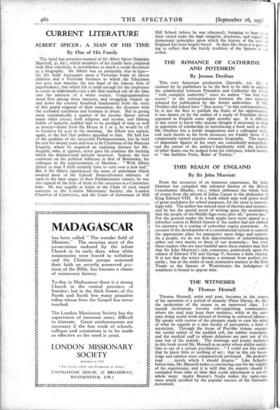THE WITNESSES By Thomas Hennell
Thomas Hennell, artist and poet, becomes in the course of his narration of a period of insanity (Peter Davies 8s. 'ed.) the spokesman of the insane as an oppressed class. Let mental institutions become self-supporting communities, where the mad may keep their madness, while at the same time doing useful work instead of fretting in enforced idleness. He speaks with sorrow of the attempts made to cure his mind of what he regards as a rare faculty of perception, a kind of mysticism. Through the tissue of Poe-like visions emerges the sordid reality of the padded cell, the rubber truncheon, and the medical staff to whom delusions are part not of the man but of the malady. The drawings and poems included in this book reveal Mr. Hennell as anartist whose ability entitles him to say of a certain psychiatrist : "I could not but realise that he knew little or nothing of art ; that in this my know- ledge and opinion were comparatively profound. He probably read . . . novels which I should despise." Like Schreber before him, Mr. Hennell makes a.convincing case for the validity of his experiences, and it is well that the experts should be reminded from tithe_ to time that social adjustment is not the whole "story: Andre Breton's Nadja makes the same case, since amply justified by the popular success of the Surrealist movement.










































 Previous page
Previous page